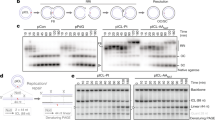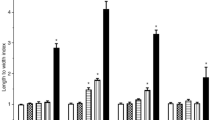Abstract
THE carcinogenic potency of alkylating agents correlates with the extent of their reaction at oxygen atoms in DNA bases1. O6-Alkylguanine is amongst those derivatives most likely to be involved in the initiation of malignant transformation since it leads to mispairing in vitro and thus can be considered promutagenic2,3. Repair excision of O6-alkylguanine from DNA has been demonstrated in bacteria4 and mammalian cells5, and seems to be initiated by a specific N-glucosidase6. In the intact animal, the persistence of O6-alkylguanine in DNA of different tissues varies considerably. In rats, the induction of neural7,8 and renal9 neoplasms correlates with a deficient excision capacity of the respective target tissues. O6-Alkylguanine produced by a single injection of the neuro-oncogenic agents N-ethyl-N-nitrosourea and N-methyl-N-nitrosourea (MNU), is removed from brain DNA significantly more slowly than from that of liver and kidney, the half life in cerebral DNA being in the range of 9–11 d for both O6-ethyl- and O6-methylguanine7,10. These data are, however, based only on observations for up to 10 d. We report here that the decay curve for O6-methylguanine in brain DNA consists of different components and that this modified base may persist in cerebral DNA for a considerable fraction of the animal's life.
This is a preview of subscription content, access via your institution
Access options
Subscribe to this journal
Receive 51 print issues and online access
$199.00 per year
only $3.90 per issue
Buy this article
- Purchase on Springer Link
- Instant access to full article PDF
Prices may be subject to local taxes which are calculated during checkout
Similar content being viewed by others
References
Lawley, P. D. Mutat. Res. 23, 283–295 (1974).
Gerchman, L. L. & Ludlum, D. B. Biochim. biophys. Acta 308, 310–316 (1973).
Loveless, A. Nature 223, 206–208 (1969).
Lawley, P. D. & Orr, D. J. Chem.-Biol. Interact. 2, 154–157 (1970).
Kirtikar, D. & Goldthwait, D. A. Proc. natn. Acad. Sci. U.S.A. 71, 2022–2026 (1974).
Lindahl, T. Nature 259, 64–66 (1976).
Goth, R. & Rajewsky, M. F. Proc. natn. Acad. Sci. U.S.A. 71, 639–643 (1974).
Kleihues, P. & Margison, G. P. J. natn. Cancer Inst. 53, 1839–1841 (1974).
Nicoll, J. W., Swann, P. F. & Pegg, A. E. Nature 254, 261–262 (1975).
Kleihues, P., Cooper, H. K., Bücheler, J., Kolar, G. F. & Diessner, H. Natn. Cancer Inst. Monogr. (in the press).
Margison, G. P. & Kleihues, P. Biochem J. 148, 521–525 (1975).
Lawley, P. D. & Shah, S. A. Chem.-Biol. Interact. 7, 115–120 (1973).
Kleihues, P. & Margison, G. P. Nature 259, 153–155 (1976).
Pegg, A. E. J. natn. Cancer Inst. 58, 681–687 (1977).
Trosko, J. E. & Chu, E. H. Y. Adv. Cancer Res. 21, 391–424 (1975).
Author information
Authors and Affiliations
Rights and permissions
About this article
Cite this article
KLEIHUES, P., BUCHELER, J. Long-term persistence of O6-methylguanine in rat brain DNA. Nature 269, 625–626 (1977). https://doi.org/10.1038/269625a0
Received:
Accepted:
Published:
Issue Date:
DOI: https://doi.org/10.1038/269625a0
This article is cited by
Comments
By submitting a comment you agree to abide by our Terms and Community Guidelines. If you find something abusive or that does not comply with our terms or guidelines please flag it as inappropriate.



